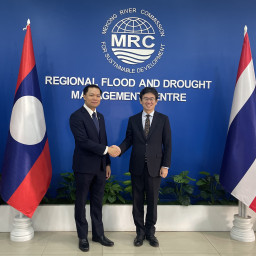Mekong strategic environmental assessment workshop studies dam development opportunities and risks
Recognising that dams are highly contentious and many interested groups have concerns and issues with any type of development proposal, the Mekong River Commission (MRC) is conducting a strategic environmental assessment (SEA) of proposed mainstream hydropower schemes on the lower Mekong mainstream river. The purpose of the SEA - underway since May 2009 - is to systematically bring together information and analysis that MRC Programmes, governments and stakeholders have assembled for input to and consideration of mainstream hydropower proposals.
The SEA is a critical component to the MRC in ensuring that all stakeholders can effectively provide their input to planning processes, have a voice in the future of the Mekong, and enable balanced consideration of proposed mainstream schemes.
A two day workshop being held over 19 – 20 May in Vientiane, Lao PDR is set to discuss wide-ranging views on hydropower development impacts in the lower Mekong Basin mainstream river. The MRC SEA has reached the third of its four phases. This impact assessment phase of the SEA considers both the development opportunities and risks posed by proposed mainstream hydropower schemes.
The assessment covers a broad range of themes identified in a collaborative process with government agencies, private sector and civil society stakeholders. These include the themes of: Hydrology & Sediment; Aquatic systems & Agriculture; Fisheries; Social systems; Economics & Livelihoods, Climate change; and Energy and Power development. The Strategic Environmental Assessment looks at the wider economic, social and environmental implications of proposed developments.
Supplementing the extensive studies conducted and data gathered by its Programmes, the MRC plans to use information presented by the SEA team to improve its ability to advise MRC member countries. “The impact assessment phase of the SEA will improve the MRC’s ability to use scientific knowledge to identify the scale of potential impacts and opportunities, gather stakeholders views on infrastructure development and use this to inform Mekong governments decisions,” said Jeremy Bird, CEO of the MRC Secretariat.
“The Mekong Governments have expressed a strong desire to comprehensively understand the full range of opportunities and risks of any proposed mainstream hydropower project - particularly those of a regional nature - through a broad stakeholder consultation process, before any decision is taken on whether to proceed.” said Mr. Bird. Representatives of China are participating via the China Ecosystem Study Commission for International Rivers (ESCIR) to provide an insight into the expected changes that result from upstream dam development in China.
Development pressures, such as intensive agriculture, large-scale construction projects and hydroelectric dams are some of the threats to the river ecosystem. The livelihoods and prosperity of over 60 million people, many of whom are farmers and fishers, depend heavily on a productive Mekong River. MRC also recognizes that this is a dynamic and unfolding situation, not only with regard to the MRC’s work, such as the Basin Development Plan scenario analysis now underway, but also the national government interactions with developers and regional discussions on cross-border power trade. The SEA provides an opportunity to bring all these elements together for consideration in an integrated manner.
A discussion draft of the SEA Impact Phase report has been released for this workshop. It will help to systematically assess and make recommendations on alternative Mekong hydropower development strategies, including the regional distribution of costs and benefits with respect to economic development, social equity and environmental protection and among different affected interests and sectors. This report will be discussed at the workshop in order for MRC to form a view and make recommendations to guide MRC member countries’ decisions on such projects.
As set out in the 1995 Mekong Agreement, MRC member countries need to follow a formal consultation process before any dam can be built on the Mekong River. Projects proposed for development in the lower Mekong Basin will need to come to the Commission for consultation with a view to assisting MRC member countries to reach consensus on whether or not individual proposals should proceed and if so, under what conditions.
-ends-
Languages
Download this press release in:
Notes to Editors
The Strategic Environmental Assessment mentioned above will build on the work undertaken by various MRC programmes, including the fisheries, navigation and agricultural programmes as well as its existing Basin Development Planning process. Country-level consultation will be through the National Mekong Committees (NMC’s) and include engagement with a wide selection of civil society and private sector views. It will look at
- Mekong mainstream hydropower development in the context of regional energy planning;
- affected people;
- fisheries and barrier effects of dams on fish migration;
- maintaining ecological integrity and biodiversity;
- river morphology and sediment balance, and
- water quality and salinity intrusion on the Mekong River.
The MRC is the intergovernmental body responsible for cooperation on the sustainable management of the Mekong Basin
whose members include Cambodia, Lao PDR, Thailand and Viet Nam. It deals with all river related sectors including sustaining fisheries, identifying opportunities for agriculture, maintaining the freedom of navigation, flood management and preserving important ecosystems. Superimposed on these are the future effects of more extreme floods, prolonged drought and sea level rise associated with climate change. In providing its advice, MRC aims to facilitate a broad range of dialogue among governments, the private sector and civil society on these challenges.
The MRC is engaged with the Chinese Government to facilitate technical cooperation and ensure that downstream river changes due to hydropower development are managed appropriately. China and Myanmar have been dialogue partners of MRC since 1996 and take an active role in information sharing and co-operation with the MRC and its four member countries.
Photos available on request.
For more information, please contact:
Anthony Dusan, A/Communication Officer,
Tel: + 856 (0)20 208 9713
E-mail: damian@mrcmekong.org
Website: www.mrcmekong.org




